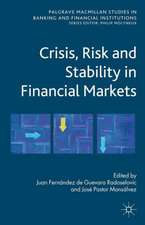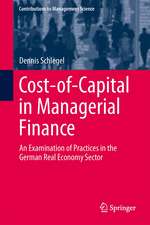Endogenous Market Structures and the Macroeconomy
Autor Federico Etroen Limba Engleză Paperback – 25 noi 2014
| Toate formatele și edițiile | Preț | Express |
|---|---|---|
| Paperback (1) | 947.85 lei 6-8 săpt. | |
| Springer Berlin, Heidelberg – 25 noi 2014 | 947.85 lei 6-8 săpt. | |
| Hardback (1) | 953.97 lei 6-8 săpt. | |
| Springer Berlin, Heidelberg – 5 iul 2009 | 953.97 lei 6-8 săpt. |
Preț: 947.85 lei
Preț vechi: 1155.91 lei
-18% Nou
Puncte Express: 1422
Preț estimativ în valută:
181.36€ • 189.38$ • 149.77£
181.36€ • 189.38$ • 149.77£
Carte tipărită la comandă
Livrare economică 15-29 aprilie
Preluare comenzi: 021 569.72.76
Specificații
ISBN-13: 9783642426001
ISBN-10: 364242600X
Pagini: 368
Ilustrații: XX, 346 p.
Dimensiuni: 155 x 235 x 19 mm
Greutate: 0.51 kg
Ediția:2009
Editura: Springer Berlin, Heidelberg
Colecția Springer
Locul publicării:Berlin, Heidelberg, Germany
ISBN-10: 364242600X
Pagini: 368
Ilustrații: XX, 346 p.
Dimensiuni: 155 x 235 x 19 mm
Greutate: 0.51 kg
Ediția:2009
Editura: Springer Berlin, Heidelberg
Colecția Springer
Locul publicării:Berlin, Heidelberg, Germany
Public țintă
ResearchDescriere
This is a key year for the evolution of international markets. The global economy is experiencing the most severe downturn since the thirties, it is temporarily leaving a path of sustained growth that characterized the last decades, and is facing an impressive decline of trade between countries. Banks are going bankrupt, the stock market has crashed, rms are going out of bu- ness or drastically reducing their production and exports, workers are being red and investment in new business creation or innovation is shrinking. Meanwhile, consumers con dence has dropped at its minimum, aggregate demand has been declining for months and expansionary policies and int- national coordination have failed to counteract the crisis until now. It is quite likely that all this will change sooner or later, but at the end of this crisis our understanding of the macroeconomy may change as well. In front of these crucial events, this book is not an attempt at proposing a radically new way of interpreting macroeconomic phenomena, and, as a m- ter of fact, it is not even a book on macroeconomic theory. My more modest goal is to collect a number of insights derived from recent research on the role of competition and innovation in the analysis of three topics: business cycles, trade and growth through innovations.
Cuprins
Neoclassical Macroeconomics.- The EMSs Approach to Macroeconomics.- Endogenous Market Structures and Business Cycles.- Endogenous Market Structures and International Trade and Finance.- Endogenous Market Structures and Growth.- Economic Principles and Policy for the New Economy.
Textul de pe ultima copertă
Endogenous Market Structures and the Macroeconomy introduces strategic interactions and endogenous entry to study business cycles, trade and growth. Going beyond the neoclassical approach, the EMSs approach provides new insights on macroeconomic policy, trade policy and R&D policy. The book discusses related empirical evidence and applications to issues of business creation, innovation and leadership in the New Economy, and it analyzes macroeconomic mechanisms and policymaking in the current crisis.
Prof. Federico Etro teaches macroeconomics at the University of Milan, Bicocca and industrial organization at the University of Edinburgh for the Scottish Graduate Programme in Economics. He studied at the U.C.L.A. and Harvard, and wrote articles for American Economic Review, International Economic Review, Economic Journal, Journal of Macroeconomics, Public Choice and the book "Competition, Innovation, and Antitrust" (2007, Springer).
Etro reviews the EMSs approach to macroeconomics and derives several new results. The potential of this approach to change the way we think about the macroeconomy emerges clearly from the impressive range of topics to which it is successfully applied. In each case, the approach challenges the traditional view and policy implications. Etro's discussion of the EMSs approach in the context of a coherent and comprehensive analytical framework provides an invaluable service to the profession.
Pietro Peretto, Duke University
For many decades, the field of industrial organization lived in the world of microeconomics, separately from the macroeconomic world of economic growth and business cycles. In recent years we have seen a fruitful convergence of the two. This book is a very useful contribution to this literature.
Avinash Dixit, Princeton University
A must read for macroeconomists and international economists who value microfoundations and view micro-level dynamics as a key determinant of aggregate phenomena. It is equally valuable as a textbook for graduate teaching and reference for researchers.
Fabio Ghironi, Boston College
Prof. Federico Etro teaches macroeconomics at the University of Milan, Bicocca and industrial organization at the University of Edinburgh for the Scottish Graduate Programme in Economics. He studied at the U.C.L.A. and Harvard, and wrote articles for American Economic Review, International Economic Review, Economic Journal, Journal of Macroeconomics, Public Choice and the book "Competition, Innovation, and Antitrust" (2007, Springer).
Etro reviews the EMSs approach to macroeconomics and derives several new results. The potential of this approach to change the way we think about the macroeconomy emerges clearly from the impressive range of topics to which it is successfully applied. In each case, the approach challenges the traditional view and policy implications. Etro's discussion of the EMSs approach in the context of a coherent and comprehensive analytical framework provides an invaluable service to the profession.
Pietro Peretto, Duke University
For many decades, the field of industrial organization lived in the world of microeconomics, separately from the macroeconomic world of economic growth and business cycles. In recent years we have seen a fruitful convergence of the two. This book is a very useful contribution to this literature.
Avinash Dixit, Princeton University
A must read for macroeconomists and international economists who value microfoundations and view micro-level dynamics as a key determinant of aggregate phenomena. It is equally valuable as a textbook for graduate teaching and reference for researchers.
Fabio Ghironi, Boston College
Caracteristici
Includes supplementary material: sn.pub/extras











